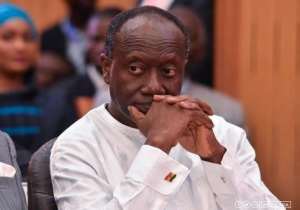
Anticipation shrouds business owners as they await Finance Minister Ken Ofori-Atta’s Mid-Year Budget Review Thursday. Economists predict that during the review, the Minister will announce a four percent increase in the value-added tax (VAT), which could overwhelm employers’ and employees alike.
“All these indirect taxes are already affecting us as workers,” Industrial and Commercial Workers Union’s General Secretary Solomon Kotei told Joy FM’s Daniel Dadzie on the Super Morning Show Tuesday. “Is it very evident that they want to hit us again.”

As of now, Ghana’s VAT stands at 17.5%, and is imposed to generate revenue for the country. Last year, VAT accounted for GHS8.5 billion, but fears of another VAT increase has owners uncertain about their businesses’ future.
One business owner told Dadzie that although his business was hit with a corporate tax hike, he bore the burden and chose not to increase prices for his customers.
“The product I was making 20 cedis profit from, now I am making 5 cedis,” said Francois Anum, a Spare Parts Dealers Association representative. “If you increase VAT again, I will have to increase prices. The government has pushed the business community to increase expenditures.”

In 2016, then-vice presidential candidate Mahamudu Bawumia told Joy FM that he understood the strain businesses experience with tax increases. His solution, he said at the time, is to capitalize on revenue through income and corporate tax.
“Let the business produce and make profit,” Bawumia said. “When they employ people, we will get income taxes and corporate taxes.”
He continued: “The tax issue is a major issue because if you are so fixated on revenue you will essentially hurt your production. If you don’t take care, you will kill businesses and kill employment.”
Kotei said that he’s “seen brilliant presentations from the government to get results.” But as of now, he “feels frightened. The kind of security that we thought the government would bring, we are not seeing.”
Related coverage: Tax and inequality
President Akufo-Addo has since called for an emergency meeting with Cabinet scheduled for Tuesday. Sources told Joy News Monday that he has not made a firm decision regarding the tax hike unless he’s discussed all options with the country’s ministers.
Former president John Mahama has criticized reports of the proposed VAT increase in a tweet stating that “the Ghanaian business sector has never experienced such difficult times in the history of the 4th Republic. Akufo-Addo’s proposed new taxes would cripple businesses further and also defeat his much-touted mantra of from taxation to production.”
TWEET HERE
Meanwhile, residents are reeling from the possibility of a tax rise.
“This doesn’t make me happy,” 22-year-old student Sani Awal told Joy News. “There’s already no money. This won’t be good for us.”
Professor Peter Quartey, head of the Economics department at the University of Ghana, argues though, that the tax is necessary for Ghana to continue on its path as one of the strongest economic competitors on the continent.
“Taxation is something that’s frowned upon by people. Nobody likes the tax collector. But that’s what we depend on to develop our country. Numbers show tax revenue accounts for 70 per cent of our total revenue,” he said.
But Dr. Priscilla Twumasi-Baffour, an economist specialising in labour markets, gender and inequality, contends that the government should tackle the tax hike from another angle.
"The VAT hits the poor,” she told Dadzie Monday. “Why not impose property taxes on residents who live in these plush buildings all around? If we all want development, taxation is a necessary evil. But there needs to be a balance.”

Professor Robert Darko Osei, associate professor of the Institute of Statistical, Social and Economic Research at the University of Ghana, agrees, but further stated that he understands the government is making an effort.
“To some extent, I sympathize with government. The revenue right now is not allowing the government to deliver what they have promised.”
Those promises include NPP’s commitment to provide education through the Free SHS policy and commitments to enhance the NHIS.
“Government is overstretched. We are basically financing ourselves without investing in capital,” Twumasi-Baffour said.
“Did the government oversell? Yes. They promised too much,” Quartey said. “But it’s also good to be ambitious,” he said, adding that “[Government] can’t continue to tax its way out of its problems. If funds are spent inefficiently, they’re fighting a losing battle.”
Story by Ghana | Myjoyonline.com | Zaina Adamu | Email: [email protected] | Twitter: @ZainaAdamu




 We’ll protect state wealth from opaque deals – Prof Jane Naana
We’ll protect state wealth from opaque deals – Prof Jane Naana
 Mauritania president says running for second term in June polls
Mauritania president says running for second term in June polls
 I won't ever say I was a mere driver’s mate' — Prof. Opoku-Agyemang
I won't ever say I was a mere driver’s mate' — Prof. Opoku-Agyemang
 2024 polls: 'EC struggling to defend credibility'— Prof. Opoku-Agyemang
2024 polls: 'EC struggling to defend credibility'— Prof. Opoku-Agyemang
 Akufo-Addo gov't's 'greed, unbridled arrogance, unrestrained impunity, sheer dis...
Akufo-Addo gov't's 'greed, unbridled arrogance, unrestrained impunity, sheer dis...
 Election 2024: Ghana needs an urgent reset, a leadership that is inspiring – Ma...
Election 2024: Ghana needs an urgent reset, a leadership that is inspiring – Ma...
 Partner NDC to rollout a future of limitless prospects – Prof Jane Naana Opoku-A...
Partner NDC to rollout a future of limitless prospects – Prof Jane Naana Opoku-A...
 NPP will remain in gov’t till Jesus comes — Diana Asamoah
NPP will remain in gov’t till Jesus comes — Diana Asamoah
 Sunyani Technical University demands apology from former SRC president over sex-...
Sunyani Technical University demands apology from former SRC president over sex-...
 'Dumsor' was resolved by Mahama but ‘incompetent' Akufo-Addo has destroyed the g...
'Dumsor' was resolved by Mahama but ‘incompetent' Akufo-Addo has destroyed the g...
